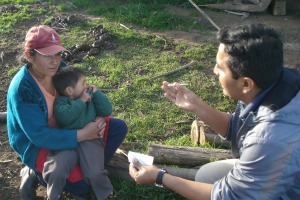Pneumonia
-

Study reveals new genetic disorder that causes susceptibility to opportunistic infections
An international consortium co-led by Vanderbilt's Rubén Martínez-Barricarte has discovered a new genetic disorder that causes immunodeficiency and profound susceptibility to opportunistic infections including a life-threatening fungal pneumonia. Read MoreJan 20, 2023
-

Probing pathogen antibiotic resistance
Understanding how bacteria evolve resistance to antibiotics and host stresses could guide the development of more effective antimicrobial therapeutics. Read MoreSep 17, 2020
-

Zinc uptake by a deadly pathogen
The increasingly antibiotic-resistant bacterium Acinetobacter baumannii requires zinc to cause infection, and Vanderbilt researchers have identified the zinc uptake system it uses. Read MoreJan 13, 2020
-

Amoxicillin alone better choice for pediatric pneumonia: study
A combination of two antibiotics is often prescribed to treat community-acquired pneumonia in children, but a JAMA Pediatrics study is now showing that using just one of the two has the same benefit to patients in most cases. Read MoreNov 9, 2017
-

Study tests shorter antibiotic course in children
Researchers at Vanderbilt University Medical Center (VUMC) are leading a multicenter clinical trial to evaluate whether a shorter course of antibiotics — five days instead of 10 — is effective at treating community-acquired pneumonia (CAP) in children who show improvement after the first few days of taking antibiotics. Read MoreDec 1, 2016
-

A bundle, a dashboard and lasting pneumonia reduction
A “bundle” of electronically implemented care guidelines reduced intensive care unit patient complications related to mechanical ventilation. Read MoreOct 20, 2015
-

Flu vaccine helps reduce hospitalizations due to influenza pneumonia: study
More than half of hospitalizations due to influenza pneumonia could be prevented by influenza vaccination, according to a study led by investigators at Vanderbilt University Medical Center, published this week in the Journal of the American Medical Association. Read MoreOct 6, 2015
-

Study highlights pneumonia hospitalizations among U.S. adults
Viruses, not bacteria, are the most commonly detected respiratory pathogens in U.S. adults hospitalized with pneumonia, according to a New England Journal of Medicine study released today and conducted by researchers at Centers for Disease Control and Prevention (CDC) and hospitals in Chicago and Nashville, including Vanderbilt University Medical Center. Read MoreJul 15, 2015
-

Vanderbilt-led multi-center study looks at antibiotic choice for treating childhood pneumonia
New Vanderbilt-led research shows hospitals are doing a better job of using antibiotics less commonly associated with antibiotic resistance to treat children hospitalized with community-acquired pneumonia (CAP). Read MoreJun 22, 2015
-

Respiratory viruses are main childhood pneumonia culprit: Study
Respiratory viruses, not bacterial infections, are the most commonly detected causes of community-acquired pneumonia in children, according to new research released Feb. 26 in the New England Journal of Medicine. Read MoreFeb 26, 2015
-

Pneumonia vaccine reducing pediatric admissions: report
In Tennessee, the introduction in 2010 of a new pneumococcal vaccine for infants and young children coincides with a 27 percent decline in pneumonia hospital admissions across the state among children under age 2. Read MoreNov 6, 2014
-

Cutting-edge research to be showcased in May
(Vanderbilt University) Potentially “game-changing” research at Vanderbilt University on infectious diseases, population health and health policy will be showcased during two interactive presentations May 15 and May 22. A segment of the Flexner Discovery Lecture Series, the new “Vanderbilt Cutting-edge Discovery” discussions are highlights of recent presentations… Read MoreMay 1, 2014
-

Flu boosts pneumococcal colonization
Influenza and parainfluenza infections – but not other respiratory viruses – increase the risk of acquiring pneumococcal bacteria, the most common cause of severe pneumonia. Read MoreMar 27, 2014
-

Penicillin equally effective as ‘big gun’ antibiotics for treating less severe childhood pneumonia, Vanderbilt study shows
Children hospitalized for pneumonia have similar outcomes, including length of stay and costs, regardless of whether they are treated with “big gun” antibiotics such as ceftriaxone or cefotaxime or more narrowly focused antibiotics such as ampicillin or penicillin. Read MoreDec 9, 2013
-

Pneumonia vaccine for children to be tested in older adults
Vanderbilt is taking part in a national study to test in older adults the use of a vaccine designed to protect children against a common cause of pneumonia. Read MoreOct 11, 2012
-

Researchers spot Achilles’ heel in respiratory virus
A new viral protein structure could jump-start vaccine development for two leading causes of lower respiratory disease in children and elderly adults. Read MoreApr 13, 2012
-

Trauma program’s infection-fighting efforts show results
Implementation of antibiotic stewardship tactics as part of infection reduction campaigns sees significant results. Read MoreNov 4, 2011
-

Grant aids pediatric pneumonia study in Peru
Carlos Grijalva, M.D., MPH, assistant professor of Preventive Medicine, will go to the rural areas of the Peruvian Andes through a $500,000 grant from the Thrasher Foundation to examine pneumonia in children in the hopes of describing the association between common respiratory viral infections and bacterial infection. Read MoreJun 8, 2011